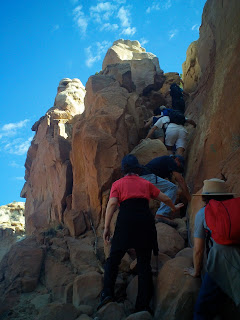During my recent trip to New Mexico, I was able to share the story of 1000 Cranes for Alaska with friends and colleagues gathered for an annual Alexander Technique retreat in the beautiful high deserts outside of Santa Fe. After a week of intense self deepening work, and many treks into the incredible natural landscape, my colleagues and I were well rehearsed in the benevolent practice of holding compassionate space for witnessing each other's transformations. It was at the tail end of this workshop when my teacher invited me to tell the story of our cranes.
I realize that I have begun to develop a relationship with this story, with the tragedy that occurred in St. Michael, and the amazing collective outpouring of support that followed us during those first few raw and vulnerable days. What surprised me this time was just how much I continue to be moved by each new telling, feeling the emotion swell in me and watching it reflected back in the faces of those with whom I am sharing.
This time was certainly no exception, and as I finished and looked around at the circle of tearful faces I had helped to create, my teacher quickly took up the calling and before I had a chance to even ask, everyone was on their feet, bringing over tables, spreading out origami paper and teaching each other how to fold paper cranes.
Many of my Alexander colleagues are from Japan, from our sister schools in Tokyo and Kyoto. As you undoubtedly know, Japan is still reeling from their very own recent tragedy, and my Japanese friends seized this opportunity to engage in an activity of collective healing. I could see through their expressions that they were engaging in a deep level of resonance with the experience, and taking their own solace in the sensation of connecting to a greater whole.
I saw and felt, once again, how transformative this simple act of folding and sharing one origami crane can be. After we finished folding, and took pictures for the website, one of my teachers said he "thinks we might really be on to something here." You know what? I think he might be right.


